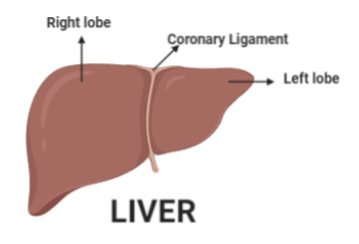
What are the functions of liver?
Answer
583.5k+ views
Hint: The liver removes unwanted particles from the blood. It produces enzymes and creates some of them as well. The functioning of the liver is affected by the consumption of alcohol so its digestion is related to the liver as well.
Step by step answer:
The liver performs multiple functions for the body. It produces many enzymes and is required by the human body to function normally. It also breaks down and detoxifies substances in the blood and also acts as a storage unit for many enzymes.

Hepatocytes are the liver cells. They are responsible for the production of the many proteins in the body which are required for several vital functions. These functions include blood clotting and maintenance of fluid within the circulatory system. The liver is also responsible for the production of cholesterol and triglycerides. The liver also secretes carbohydrates and it is responsible for converting glucose into glycogen which is stored both in the liver and in the muscle cells. The liver also produces bile which helps in food digestion. The liver plays an important role in removing toxins from the body. It is done by converting ammonia which is a byproduct formed after the metabolism of food in the body, into urea that is excreted through urine produced by the kidneys. The liver is responsible for breaking down the medications, drugs and alcohol consumed by the person. It is responsible for cleaving the hormone insulin and other hormones secreted by the body. The liver stores vitamins and enzymes that the body requires. These are vitamin A, vitamin D, folic acid, vitamin B12, vitamin K, and iron.
Note: There are many diseases that affect the liver are Hepatitis A, B, and C, the liver can also be affected by liver cancer. It is also affected by too much consumption of alcohol causing fatty liver disease. There are some inherited diseases as well like hemochromatosis and Wilson's disease.
Step by step answer:
The liver performs multiple functions for the body. It produces many enzymes and is required by the human body to function normally. It also breaks down and detoxifies substances in the blood and also acts as a storage unit for many enzymes.

Hepatocytes are the liver cells. They are responsible for the production of the many proteins in the body which are required for several vital functions. These functions include blood clotting and maintenance of fluid within the circulatory system. The liver is also responsible for the production of cholesterol and triglycerides. The liver also secretes carbohydrates and it is responsible for converting glucose into glycogen which is stored both in the liver and in the muscle cells. The liver also produces bile which helps in food digestion. The liver plays an important role in removing toxins from the body. It is done by converting ammonia which is a byproduct formed after the metabolism of food in the body, into urea that is excreted through urine produced by the kidneys. The liver is responsible for breaking down the medications, drugs and alcohol consumed by the person. It is responsible for cleaving the hormone insulin and other hormones secreted by the body. The liver stores vitamins and enzymes that the body requires. These are vitamin A, vitamin D, folic acid, vitamin B12, vitamin K, and iron.
Note: There are many diseases that affect the liver are Hepatitis A, B, and C, the liver can also be affected by liver cancer. It is also affected by too much consumption of alcohol causing fatty liver disease. There are some inherited diseases as well like hemochromatosis and Wilson's disease.
Recently Updated Pages
Master Class 11 Computer Science: Engaging Questions & Answers for Success

Master Class 11 Business Studies: Engaging Questions & Answers for Success

Master Class 11 Economics: Engaging Questions & Answers for Success

Master Class 11 English: Engaging Questions & Answers for Success

Master Class 11 Maths: Engaging Questions & Answers for Success

Master Class 11 Biology: Engaging Questions & Answers for Success

Trending doubts
One Metric ton is equal to kg A 10000 B 1000 C 100 class 11 physics CBSE

There are 720 permutations of the digits 1 2 3 4 5 class 11 maths CBSE

Discuss the various forms of bacteria class 11 biology CBSE

Draw a diagram of a plant cell and label at least eight class 11 biology CBSE

State the laws of reflection of light

Explain zero factorial class 11 maths CBSE




